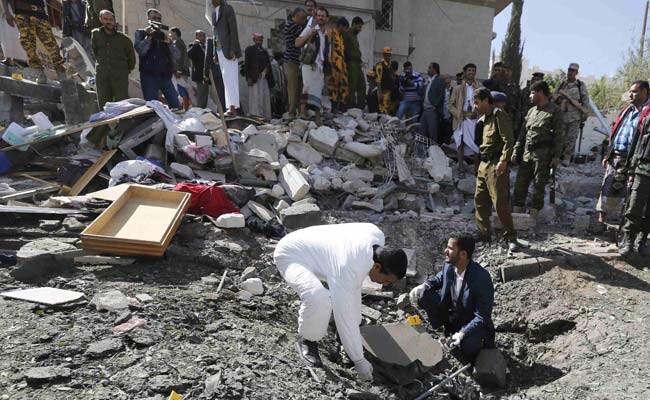
Forensic investigators work at the scene of a car bomb attack outside the residence of the Iranian ambassador in Sanaa.(Reuters)
Sanaa:
A suicide attacker drove a car laden with explosives at the Iranian ambassador's residence in the Yemeni capital Sanaa on Wednesday, security officials said, killing three people.
There was no immediate claim of responsibility for the attack, which occurred while Iran's envoy was away. But it mirrored past bombings carried out by al Qaeda's Yemen branch, Sunni Muslim jihadists who often targets state institutions and regard Shi'ite Muslims as heretics.
Iran, the Middle East's major Shi'ite power, backs Yemen's Shi'ite Houthi rebel movement that took over Sanaa in September and has since seized swathes of the country's north and centre.
Wednesday's attack, the second such bombing in the capital in as many months, blew a large hole in the Iranian residence and sent rubble flying across the street of the well-guarded diplomatic quarter of the city, a Reuters witness said.
A medical official said a Yemeni civilian and two soldiers were killed. Seventeen people, mostly employees from a nearby oil ministry building, were wounded.
Security officials said the ambassador was unhurt, having left his residence for the embassy 10 minutes before the attack.
"Glass shattered on me from the force of the explosion," Bashir al-Ossaimy, who works at a drug company opposite the residence, told Reuters. He had two bandages on his face, a swollen eye and bloodstained jacket and shirt.
Al Qaeda in the Arabian Peninsula (AQAP), the global jihadist group's Yemen wing, claimed responsibility for a bombing in Sanaa on Oct. 9 when a suicide attacker struck a Houthi checkpoint, killing 47 people.
AQAP decries Iranian influence in politically volatile Yemen and rejects the political ascendancy of the Houthis, who took over Sanaa after weeks of anti-government demonstrations.
Iranian Deputy Foreign Minister Hossein Amir Abdollahian told the official news agency IRNA that Tehran counted on Yemen to "quickly identify and punish the culprits behind the terrorist act".
Inside the embassy compound, an Iranian flag was draped over some of the rubble left by the explosion. Part of the perimeter wall had caved in and several Houthi militia officials were on the scene, as well as regular Yemeni security officials.
Western and Gulf Arab countries are worried that instability in Yemen could strengthen al Qaeda. They have supported a U.N.-backed political transition to democracy since 2012 led by President Abd-Rabbu Mansour Hadi after decades of autocracy.
Sunni Saudi Arabia, traditionally the dominant outside influence in Yemen, has been alarmed by the Houthis' friendship with Shi'ite Iran, the kingdom's arch regional rival. Riyadh fears the Houthis may seek to emulate the king-making role played in Lebanon by the Shi'ite militia Hezbollah there.
Iranian diplomats have been targeted in Yemen before. One diplomat is being held hostage by suspected Sunni militants and another was killed this year when he resisted a kidnapping attempt.
There was no immediate claim of responsibility for the attack, which occurred while Iran's envoy was away. But it mirrored past bombings carried out by al Qaeda's Yemen branch, Sunni Muslim jihadists who often targets state institutions and regard Shi'ite Muslims as heretics.
Iran, the Middle East's major Shi'ite power, backs Yemen's Shi'ite Houthi rebel movement that took over Sanaa in September and has since seized swathes of the country's north and centre.
Wednesday's attack, the second such bombing in the capital in as many months, blew a large hole in the Iranian residence and sent rubble flying across the street of the well-guarded diplomatic quarter of the city, a Reuters witness said.
A medical official said a Yemeni civilian and two soldiers were killed. Seventeen people, mostly employees from a nearby oil ministry building, were wounded.
Security officials said the ambassador was unhurt, having left his residence for the embassy 10 minutes before the attack.
"Glass shattered on me from the force of the explosion," Bashir al-Ossaimy, who works at a drug company opposite the residence, told Reuters. He had two bandages on his face, a swollen eye and bloodstained jacket and shirt.
Al Qaeda in the Arabian Peninsula (AQAP), the global jihadist group's Yemen wing, claimed responsibility for a bombing in Sanaa on Oct. 9 when a suicide attacker struck a Houthi checkpoint, killing 47 people.
AQAP decries Iranian influence in politically volatile Yemen and rejects the political ascendancy of the Houthis, who took over Sanaa after weeks of anti-government demonstrations.
Iranian Deputy Foreign Minister Hossein Amir Abdollahian told the official news agency IRNA that Tehran counted on Yemen to "quickly identify and punish the culprits behind the terrorist act".
Inside the embassy compound, an Iranian flag was draped over some of the rubble left by the explosion. Part of the perimeter wall had caved in and several Houthi militia officials were on the scene, as well as regular Yemeni security officials.
Western and Gulf Arab countries are worried that instability in Yemen could strengthen al Qaeda. They have supported a U.N.-backed political transition to democracy since 2012 led by President Abd-Rabbu Mansour Hadi after decades of autocracy.
Sunni Saudi Arabia, traditionally the dominant outside influence in Yemen, has been alarmed by the Houthis' friendship with Shi'ite Iran, the kingdom's arch regional rival. Riyadh fears the Houthis may seek to emulate the king-making role played in Lebanon by the Shi'ite militia Hezbollah there.
Iranian diplomats have been targeted in Yemen before. One diplomat is being held hostage by suspected Sunni militants and another was killed this year when he resisted a kidnapping attempt.
© Thomson Reuters 2014

